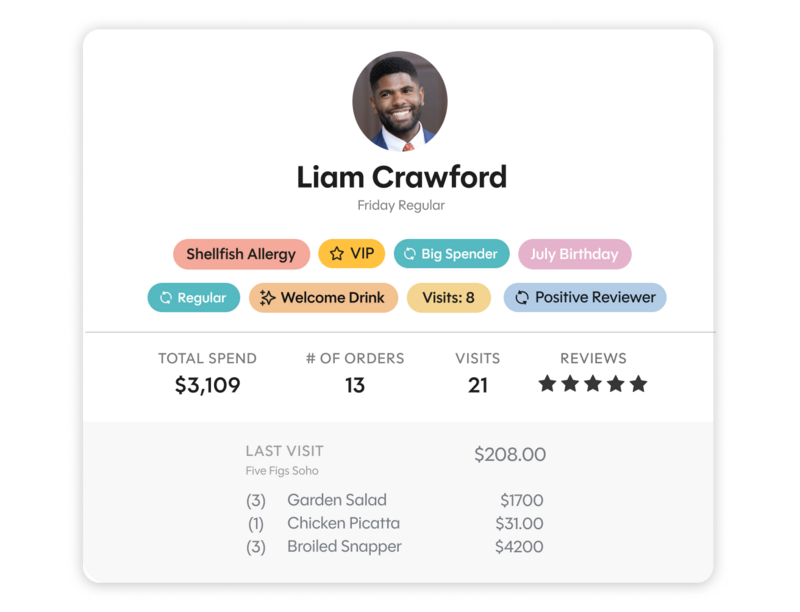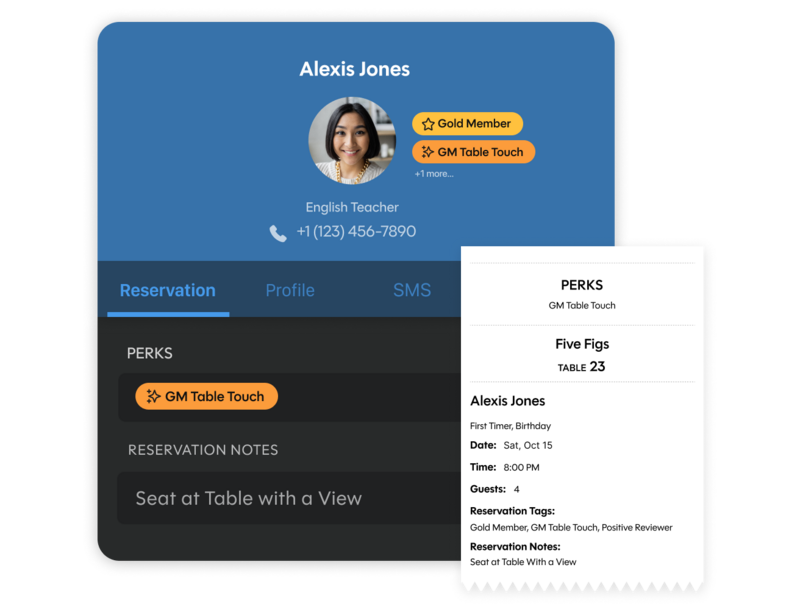Why Your Restaurant Really Needs a CRM

Bianca Esmond
5 min read
Jun 18, 2025


Bianca Esmond
5 min read
Jun 18, 2025

Nearly 70% of diners are one-and-done: they visit once, enjoy the meal and never return. For restaurant operators, that’s a lot of effort with little to show for it. When so much time and energy is spent trying to impress new guests, it can feel like a constant grind.
But here’s the thing, you don’t have to keep starting from scratch.
Our 2025 Restaurant Trends report reveals a simple yet powerful truth: diners are more likely to return when they feel personally welcomed. A warm greeting from the host isn’t just a nicety — it’s the key to fostering loyalty.
It’s these small, personalized touches that keep guests coming back for more. But how do you deliver this level of care at scale, especially when you’re juggling new faces with every seating? That’s where a restaurant CRM system comes in
A restaurant customer relationship management (CRM) system is a restaurant guest database that connects multiple systems, like your POS, marketing, reservations and online orders. It give you a holistic view of your diners. It helps you retain customers by effectively managing the critical guest data that makes personalized service and marketing possible.
CRM systems can include a variety of data collection features, with the most common being:
With a CRM like SevenRooms, these details are automatically added to guest profiles which your team can use to personalize every guest interaction. Automated and custom tags like "positive reviewer" or "wine lover" can be added to profiles to help segment your database to tailor marketing campaigns and offers.

Today’s diners expect high-touch experiences and personalization at every turn.
Small touches, like remembering a guest’s birthday or offering a commemorative, tailored menu can have a big impact. Yet many operators, nearly 8 in 10 (77%), struggle to personalize at scale.
The biggest challenge? Knowing who and how to personalize for, and tracking the success of these efforts.
A CRM addresses these challenges by enabling simple, scalable personal touches within your workflow while also measuring the impact of your efforts, allowing you to refine your strategy and maximize return on investment.
While many CRMs offer advanced features, it’s crucial to choose one that excels at the basics: providing easy access to guest profiles and enabling personalized service and marketing.
Here are six proven ways to use your restaurant CRM to strengthen guest relationships and drive revenue:
The best restaurant CRMs integrate with your existing tech stack to share guest data across your POS system, reservation system, online ordering, email and SMS marketing. Not only are disparate systems tough to track, but they also affect data accuracy. By centralizing guest information in one system, you improve data precision and gain access to key insights for more effective marketing and service.
Doubling down on data consolidation helped Solotel in Australia access deeper, more impactful insights into its customers, driving thousands of dollars in additional revenue.
Now, the team has access to data from multiple sources in a central hub, including SevenRooms’ CRM, guest profiles, marketing automation and an array of integrated digital marketing solutions from other customer systems.
When you track booking patterns and visit history, you can better analyze sales trends and target your marketing efforts. Recording more specific data like dining preferences and food allergies can help you deliver the best possible experience for your most loyal guests — right down to their favorite corner booth they book for special occasions.
Restaurant CRM software also allows staff to deliver personalized customer experiences at scale with minimal effort.
By referencing the rich data stored for each guest, you can easily identify opportunities to tailor their experience and exceed expectations.
Our recent research revealed the most sought-after in-dining personalization touches from consumers:
For instance, by tracking guest seating preferences in their profile notes, you can effortlessly deliver these simple yet impactful touches, enhancing the overall experience and fostering long-term loyalty.
With a technology aid, your front-of-house team can delight each guest without having to memorize individual preferences. For example, your staff can offer more targeted upsells to increase guest spend:
Data collected from a CRM can be used to fuel loyalty programs. The more you know about your customers, the better you can predict who will best serve your customer loyalty programs.
Using CRM data, you can implement loyalty perks such as birthday rewards, gift cards, signup bonuses, points programs and review incentives to keep guests returning.
For example, you might send a thank you text and promotional offer to a guest who left an online review and then add a "positive reviewer” tag to their guest profile.

More than 8 in 10 consumers (and 95% of Millennials) are open to signing up for restaurant marketing updates via email or text — especially if it gives them access to VIP events, exclusive tastings, cooking classes, mixology workshops and more. The key is personalization — the more tailored the message, the more successful your campaign.
Using CRM data, you can send targeted, segmented email and SMS marketing campaigns to specific customer groups, improving engagement and increasing conversions.
Examples of targeted email marketing campaigns:
In Good Company our of New York saw a 400% increase in email capture and a 68% boost in open rates by utilizing their CRM data to create targeted campaigns. Read their full story here.
While there are several CRM options available, traditional systems like Salesforce, Zoho or Sugar CRM are designed for industries beyond hospitality. What works for retail and healthcare doesn’t always suit restaurants. For a full list of the best restaurant CRM solutions, check out our comparison guide.
What should you look for in a restaurant CRM? Here are a few important questions to consider when evaluating a CRM system for your business:
The SevenRooms CRM was built to empower restaurant operators to deliver elevated customer experiences at every touchpoint. The software captures the most vital guest data (automatically) and integrates seamlessly with your restaurant reservation system and POS.
Having a robust restaurant CRM platform (like SevenRooms’) is vital if you own multiple venues. It centralizes guest data across all locations and touchpoints.
Ready to see how SevenRooms can transform your guest experience and drive revenue? Schedule a personalized demo today and discover how our CRM system can benefit your restaurant, with features that cater specifically to your needs.
“It’s really exciting now because we can see so much. And it’s really underpinned by SevenRooms.” - Robert Squillacioti, chief marketing officer of Solotel
“[Our CRM system] allows us to learn about our guests before, during and after their experiences — and that’s awesome. It’s enabled us to take a whole new approach to marketing.” - Rob McGovern, director of hospitality at In Good Company